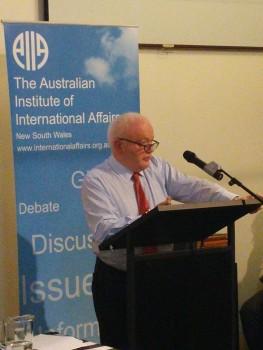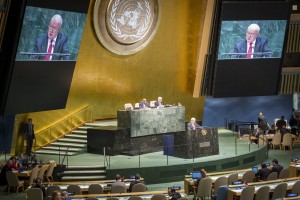UN Security Council: was it worth it?
Australia’s Ambassador to the United Nations, Gary Quinlan, completed a distinguished two year term as Australia’s representative on the UN Security Council at the end of December 2014. A capacity crowd listened to his reflections at Glover Cottages in Sydney on Tuesday evening, 24 March.
Gary said that if the United Nations didn’t exist, it couldn’t be invented today. It had been negotiated in a simpler post-colonial era, but today’s world was infinitely more complex. Conflicts were no longer mainly between states, but were more and more frequently internal, sectarian and tribal, in which civilians and peace-keepers were increasingly targeted. There were 56 million displaced persons, a number that was rising.
Gary observed that the Security Council was underfunded to meet crises and functioned imperfectly, but it did what it was allowed to do by its members. He judged his own effectiveness and that of his colleagues on the Council in 2013 and 2014 against several criteria: core Australian national interests, initiatives he could bring to the Council, and how effectively he and his colleagues could handle tasks set by the Council. Among positive achievements he listed the securing of a high level review of UN sanctions, and ways to make them fairer and help states implement them; securing a mandate for US-led international forces to remain in Afghanistan; co-sponsoring a resolution for aid to victims of war in Syria; negotiating a resolution for the control of the global trade in small arms; protection of civilians during peace-keeping operations; co-sponsoring a Council meeting to discuss the commission of Inquiry led by retired High Court judge Michael Kirby on human rights abuses in North Korea; getting Russian and American agreement to a UN-mandated process to dismantle Syria’s chemical arsenal; and securing an independent investigation into the destruction of Malaysian Airlines Flight 17 over eastern Ukraine in July 2014. In all these endeavours, he and his Australian colleagues had had to be agile and pragmatic, and despite some often strongly expressed views by other delegations, determined not to lose their nerve. He hoped Australia’s election to the Council, unlike in the past, would become more regular and predictable.
Summary by Richard Broinowski
To view the video edit, please go to: https://www.facebook.com/aiiansw and click on the video of Gary Quinlan

